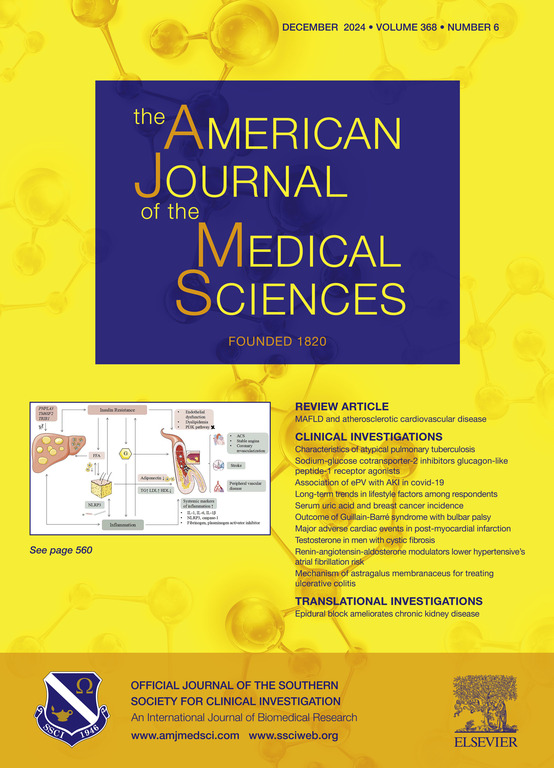Systemic investigation of the mechanism underlying the therapeutic effect of Astragalus membranaceus in ulcerative colitis
IF 2.3
4区 医学
Q2 MEDICINE, GENERAL & INTERNAL
引用次数: 0
Abstract
Background
Whether Astragalus membranaceus is an effective drug in the treatment of ulcerative colitis (UC) is unknown and how it exhibits activity in UC is unclear.
Methods
TCMSP, GeneCards, String, and DAVID databases were used to screen target genes in PPI network and we performed GO and KEGG pathway enrichment analysis. Molecular docking and animal experiments were performed. The body weight and disease activity index (DAI) of mice were recorded. ELISA kits were used to detect the levels of CAT, SOD, MDA and IL-6, IL-10, TNF-α in the blood of mice. Western blot kits were utilized to measure the expression of MAPK14, RB1, MAPK1, JUN, ATK1, and IL2 proteins.
Results
The active components of Astragalus membranaceus mainly include 7-O-methylisomucronulatol, quercetin, kaempferol, formononetin and isrhamnetin. Astragalus membranaceus may inhibit the expression of TNF-α, IL-6, MDA, while promoting the expression of CAT, SOD, and IL-10. The expression levels of MAPK14, RB1, MAPK1, JUN and ATK1 proteins were significantly decreased while IL2 protein increased after administration of Astragalus membranaceus.
Conclusions
Astragalus membranaceus may be an effective drug in the treatment of UC by acting on targets with anti-UC effect via its antioxidant action and by regulating the balance of pro-inflammatory and anti-inflammatory factors.
系统研究黄芪对溃疡性结肠炎的治疗作用机制。
背景:黄芪是治疗溃疡性结肠炎(UC)的有效药物吗?黄芪是否是治疗溃疡性结肠炎(UC)的有效药物及其对UC的活性作用尚不清楚:方法:利用 TCMSP、GeneCards、String 和 DAVID 数据库筛选构建 PPI 网络的靶基因,并分别进行 GO 和 KEGG 通路富集分析。进行了分子对接和动物实验。记录小鼠的体重和疾病活动指数(DAI)。用 ELISA 试剂盒检测小鼠血液中 CAT、SOD、MDA 和 IL-6、IL-10、TNF-α 的水平。用Western印迹试剂盒检测MAPK14、RB1、MAPK1、JUN、ATK1和IL2蛋白的表达:结果:黄芪的有效成分主要包括7-O-甲基异黄芪醇、槲皮素、山柰醇、甲萘素和异鼠李素。黄芪可抑制 TNF-α、IL-6、MDA 的表达,促进 CAT、SOD、IL-10 的表达。服用黄芪后,MAPK14、RB1、MAPK1、JUN和ATK1蛋白的表达水平明显下降,而IL2蛋白的表达水平上升:根据上述靶点,黄芪是一种治疗UC的有效药物,可通过其抗氧化途径和调节促炎因子与抗炎因子的平衡发挥抗UC作用。
本文章由计算机程序翻译,如有差异,请以英文原文为准。
求助全文
约1分钟内获得全文
求助全文
来源期刊
CiteScore
4.40
自引率
0.00%
发文量
303
审稿时长
1.5 months
期刊介绍:
The American Journal of The Medical Sciences (AJMS), founded in 1820, is the 2nd oldest medical journal in the United States. The AJMS is the official journal of the Southern Society for Clinical Investigation (SSCI). The SSCI is dedicated to the advancement of medical research and the exchange of knowledge, information and ideas. Its members are committed to mentoring future generations of medical investigators and promoting careers in academic medicine. The AJMS publishes, on a monthly basis, peer-reviewed articles in the field of internal medicine and its subspecialties, which include:
Original clinical and basic science investigations
Review articles
Online Images in the Medical Sciences
Special Features Include:
Patient-Centered Focused Reviews
History of Medicine
The Science of Medical Education.

 求助内容:
求助内容: 应助结果提醒方式:
应助结果提醒方式:


